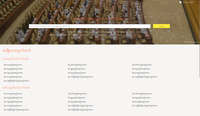Legislative Open Data - Open Hluttaw
| Start Date | |
| End Date |
In spite of well-developed Parliamentary websites in Malaysia and Indonesia and legislative openness (in the case of Indonesia), these countries do not have any clear government action or policy towards implementing parliamentary digital services even though Open Data is needed by parliamentarians, the executive, civil society and media. Past work by Sinar Project supported by OD4D, has demonstrated that legislative information on parliamentarians such as contact, constituency, political party and posts in committees held, if made available as open data and while following international standards, can encourage innovations such as web and mobile applications. The adoption of open standards was also shown to enable collaboration in the provision and use of open data both locally and regionally.
The Ananda (Myanmar) with the support of Sinar Project (Malaysia) through active research, looked to build upon these findings, by digitizing parliamentary transcripts and making them available as legislative open data following Akoma Ntoso data standard for legislative documents. The Ananda then worked on an initial website, and conducted workshops for parliamentarians and civil society to introduce them to digital parliamentary tools, and gather feedback. Both partners also through their respective websites published additional articles or presented at workshops, on the different ways that important parliamentary information and data could be used to highlight public interest issues.
The key objectives of this active research are to address these questions:
- Can parliamentary documents accessed via digital services and data help civil society understand the work of their elected representatives in parliament; and can they help parliamentarians understand concerns of their constituents and review issues brought up in parliament?
- Can better access to government data such as budgets, procurement by parliamentarians help reduce corruption and help citizens engage parliament better?
- What parliamentary international open data standards would be applicable for Myanmar? How applicable are they, and what gaps or issues in their application for Myanmar?
- How can document publishing and open data standards help in ensuring sustainability and accessibility of parliamentary information?
Methodology
Myanmar Open Legislative Data initiative aims to provide digitised transcripts and services to make Myanmar parliament and the work of elected representatives more accessible. It was envisioned that the website “Your Champions in Hulttaw (Parliament)” will enable Myanmar citizens to access and search topics of discussions of Members of Parliament. Due to technical difficulties an intermediate step in providing these features in a standalone transcripts website was developed first.
Through analysis of open legislative data created through this project, researchers and media will also be able to provide trends of discussions of topics of elected representatives, as well as integrate this data into other websites and apps.
To provide such features, the project team will need to acquire and digitize parliamentary documents and transcripts. These documents then need to be parsed into structured open data.
Project Outputs
Initial expected outputs from this project are listed below with all outputs including dissemination in table below:
- Digitized legislative transcripts made available as open data following international open data standards
- Development of a website to access and search transcripts by MP, text and topicst
- Research notes on process and findings of active research
- MP and CSO workshops to introduce transcription website, use of open legislative data and gather user feedback
Project Outcomes
The project encountered a few issues during the digitization and conversion of legislative documents to open data.
- In Myanmar parliament requires capacity building and reforms to become a digital parliament, to proactively publish parliamentary documents and data in digital format. Although transcript documents are available in digital format, they are unstructured, published with inconsistent naming conventions and difficult to parse and made available as open data. Digital capacity building must therefore also include data literacy to enable reforms in generation of digital parliamentary documents that enable open data to be published and digital services to be developed that server parliamentarian and public needs better. This is applicable to both Myanmar and Malaysian parliament.
- Optical Recognition Software (OCR) language support in commonly used open source libraries such as Tesseract for Burmese is lacking and error prone. The project used Google Cloud Vision API via Google Drive instead to improve accuracy. Burmese script also introduces additional misspellings due to different unicode codepoints and orders, requiring additional processing.
- NLP support for Burmese language (and other Southeast Asian languages) is not supported by common open source libraries, and requires more research as well as packaging to be more useful and widely adopted. To apply machine learning to automatically tag topics of parliamentary transcripts, required translating to English and then back first, introducing additional translation inaccuracies.
Regionally across Southeast Asia, the challenges and problems for availability of legislative documents and data are common despite different legislative systems, economic and technological capacity level or languages.
Th active research also identified that parliamentary capacity building initiatives must also include digital services and open data literacy and capacity components.
The project also identified that much more technical research needs to go into technical improvements for support of Southeast Asian languages for OCR and NLP, as enabling tools to make digital documents and NLP machine learning accessible to countries in Southeast Asia.
Finally, this project reinforces the point that local and cross-border collaborations are possible through shared approaches to solutions for common problems and lessons learned in making legislative open data available. We should seek to expand these efforts and collaborations with parliaments in other countries in the region.

